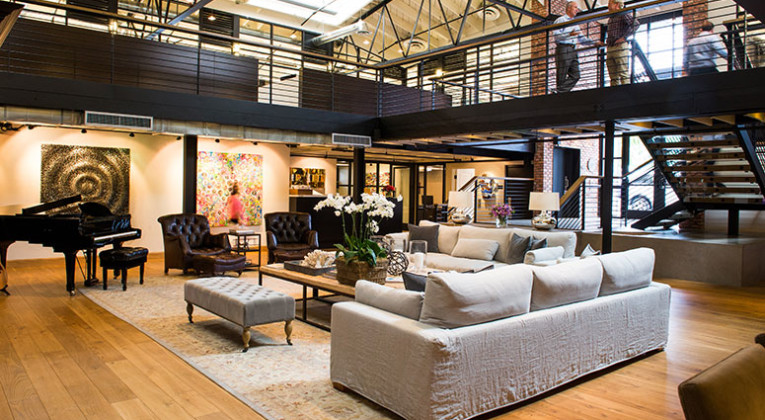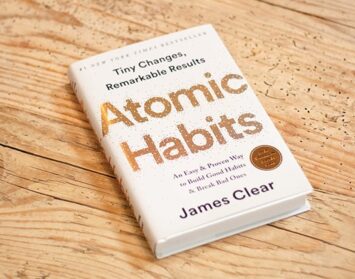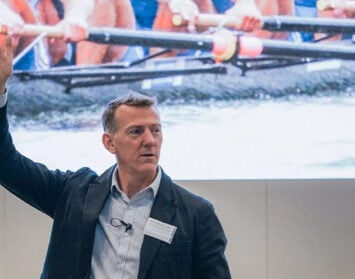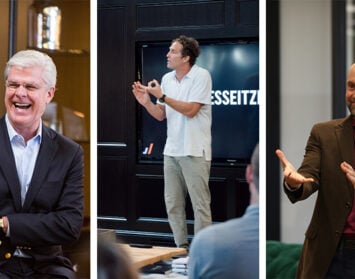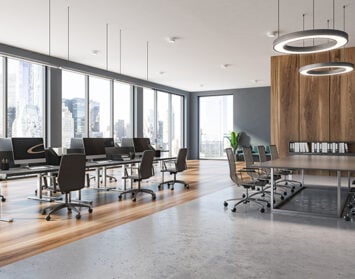By Tom York
Dan Khabie got exactly what he was looking for when he moved his digital marketing firm from the Gaslamp into 18,000 square feet of space in East Village’s DiamondView Tower in 2011.
Khabie, CEO of the Mirum, a unit of New York City advertising giant J. Walter Thompson Co., wanted clients from such accounts as the Ford Motor Co., Del Monte Foods, Qualcomm and Taylor Guitars to see firsthand that he was on the cutting-edge of digital marketing.
“We wanted the office to buzz … to feel the energy,” Khabie said. “So we opened up the entire floor for better collaboration.”
Mirum’s office, which commands breathtaking views of Petco Park and the bayfront, includes such features as counter-high benches with work stations where his millennial-dominated workforce can interact, as well as plenty of open areas.
The layout even includes a special area complete with networking access where clients can work side by side Mirum’s digirati workforce, as well as nooks and crannies with comfortable chairs and couches.
“We needed spots where our employees could gather, where they could launch projects,” he said. “We’ve transformed these spaces into ‘joint development’ areas where everyone can come together and work,” Khabie said.
Jason Hughes, CEO and owner of downtown San Diego tenant rep agency Hughes Marino, said forward-minded employers such as Khabie, seeing what Google, Facebook and other tech firms have wrought with their office headquarters in Silicon Valley, want similar amenities here when they go office shopping.
“There is so much more value to be gained from new office space if it reflects the culture of the company,” he said.
In addition to open work areas, he pointed out that employers ask for plenty of private spaces to give employees a break from the tight confines of crowded work benches.
They also ask for such amenities as basketball courts, gyms, and masseuses, not to mention the occasional request for a bar serving beer, wine and liquor and fully equipped kitchens that can be used to serve up a gourmet meal.
“Tenants are being very particular about space, and how it represents the culture of their company,” Hughes said. “There are those who are all about super-cheap space, but less and less have those mindsets.”
Aware of the shift in what tenants want, Hughes said commercial building owners and developers have rushed in to satisfy demand.
But all those amenities come with an increase in the monthly rent check.
“Tenants are a little surprised by the cost of all of these amenities that they are so attracted to,” he said. “It comes with a big cost. ‘Wow,’ they say, ‘It’s really cool but we’re not sure it’s worth an extra dollar a foot in rent.’”
“It’s like staying in a five-star property,” he added. “If you’re not using the spa or other amenities, you might feel like you’re paying a lot for just that room you spend 8 hours in.”
Standing Out
Lauren Kelly, the Irvine Co.’s chief marketing officer, said millennials identify with their workplace to the point that it becomes an extension of their lifestyle.
“The most forward-looking companies looking to compete for talent need a vibrant workplace in order to differentiate themselves with the millennials,” Kelly said.
Based in Newport Beach, Irvine Co. owns and operates a portfolio of 500 buildings in Southern California and Silicon Valley. It is the largest office property owner in San Diego County.
To differentiate itself, Kelly said her company will soon launch a program with an as-yet-unnamed San Diego health care provider aimed at boosting well-being and fitness.
The health care services will be delivered along with a state-of-the-art fitness facility, such as that being incorporated into The Irvine Co.’s recently completed 15-story, 360,000-square-foot One La Jolla Center in UTC.
She said One La Jolla Center includes a signature feature called the Commons that offers both indoor and outdoor space, allowing employers to hold such events as team building after work.
Designing for Company Culture
Viveca Bissonnette, a principal with the Hollander Design Group in San Diego, said there’s been some backlash against the open office environment, in part driven by the rising cost of real estate.
“Many people have difficulty doing their jobs in open spaces,” she said. “Tenants are asking for private space … so their workers can concentrate.”
So the firm’s Jeff Hollander and Bissonnette work closely with clients to determine the culture of their company as well as the make-up of the individuals in the workforce to meet those demands for private as well as public spaces.
“We design specifically for the culture as opposed to a blanket trend,” she said.
She said employers want to link open spaces to indoor workplaces to take advantage of San Diego’s year-round favorable climate.
She said one building owner removed portions of an exterior wall to allow for greater access to the outdoors, and transformed a portion of a parking lot into a garden.
And while individual workspace is generally shrinking the overall lease space is increasing as tenants ask for such features as kitchens and cafes as well as recreation and fitness spaces.
Such added features bump up the square footage leased by tenants.
“The way employees are working means they use less personal space, but they need a whole lot more other kinds of space,” she added. “They need a reason to come into the office.”
This article originally appeared in the San Diego Business Journal.
Jason Hughes is founder of Hughes Marino, an award-winning commercial real estate company with offices across the nation. A pioneer in the field of tenant representation, Jason has exclusively represented tenants and buyers for more than 30 years. Contact Jason at 1-844-662-6635 or jason@hughesmarino.com to learn more.

